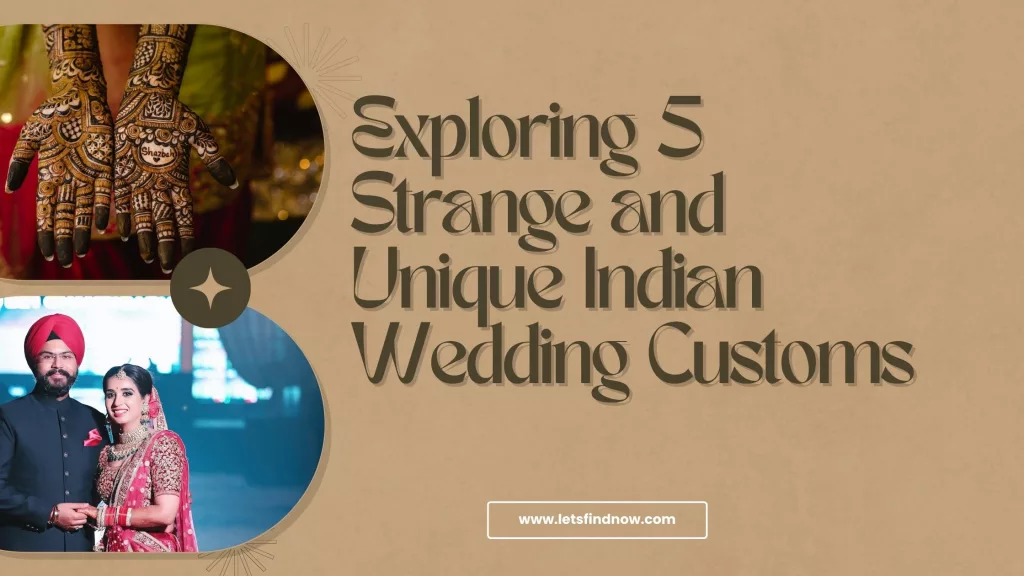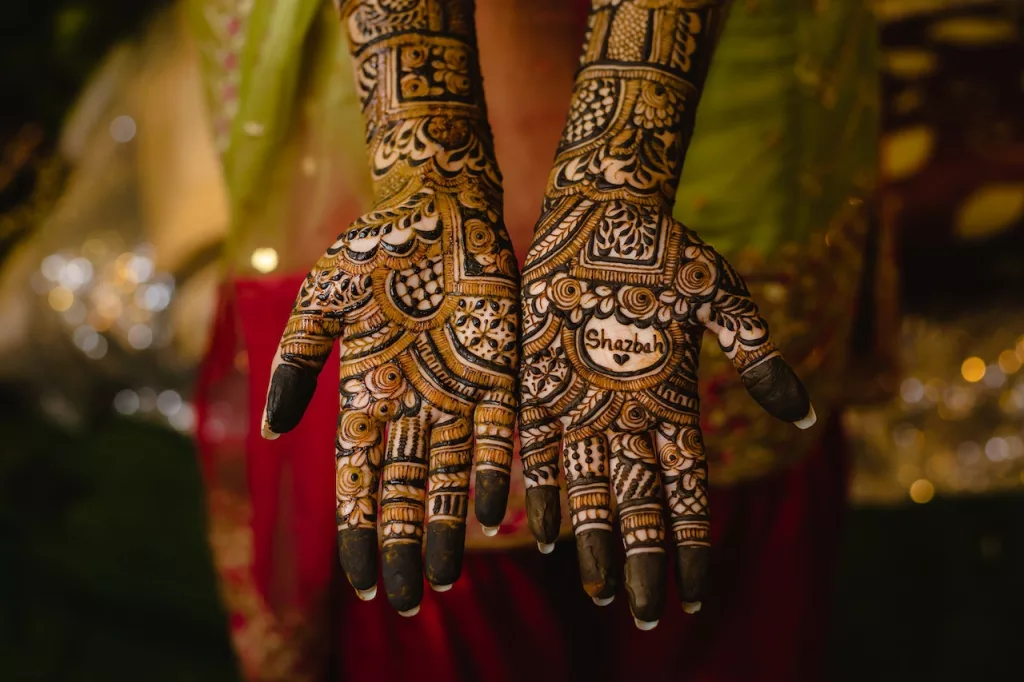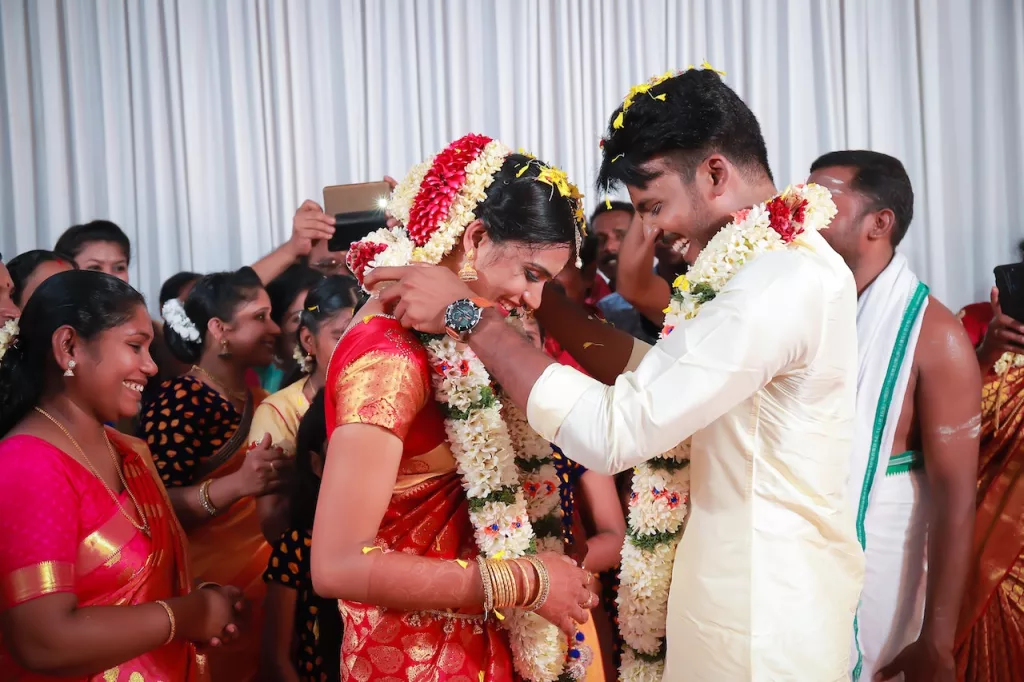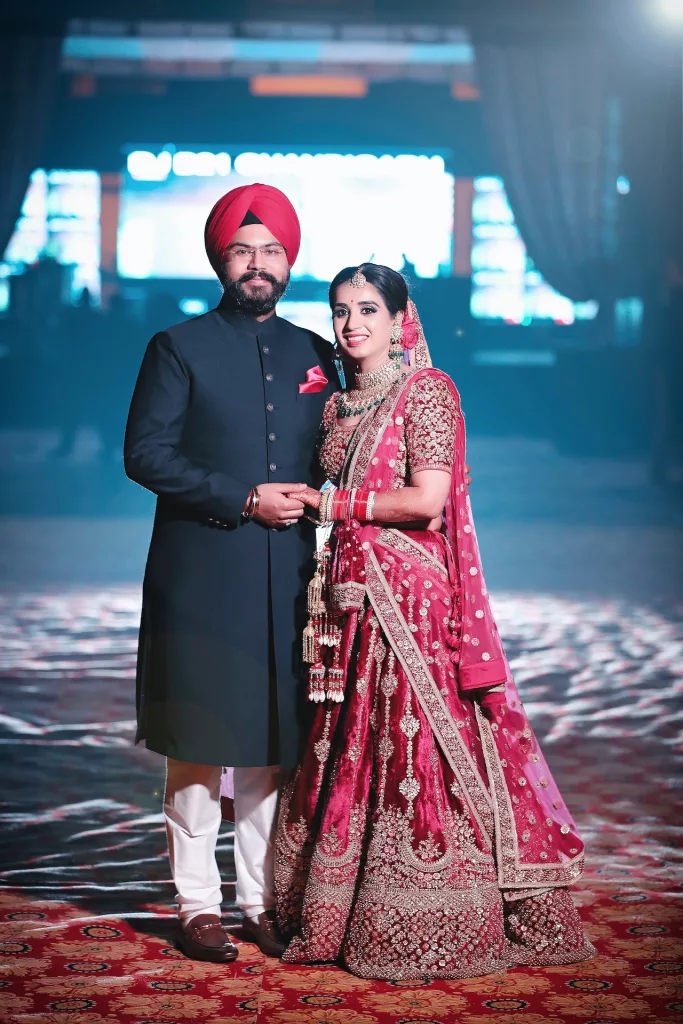Weddings are a celebration of love and commitment, but they can also be a showcase of unique cultural traditions. In India, weddings are particularly colorful and vibrant, with a variety of customs and rituals that might seem strange to outsiders. From pre-wedding ceremonies to the actual wedding day, there are many weird things that Indians do on their weddings that are steeped in tradition and cultural significance. In this article, we’ll explore 5 of these peculiar wedding customs and try to understand their meaning and significance in Indian culture. Whether you’re planning an Indian wedding or just curious about these cultural practices, this article will give you an inside look at some of the weird and wonderful things that happen at Indian weddings.

Pre-Wedding Rituals
Pre-wedding rituals are an important part of Indian weddings and often start weeks before the actual wedding day. These rituals serve as a way for the families of the bride and groom to come together and celebrate the upcoming nuptials. Here are some weird pre-wedding rituals that are commonly practiced in India:
Mehndi ceremony: The mehndi ceremony is a fun and festive occasion where the bride’s hands and feet are decorated with intricate henna designs. The ceremony is usually held a few days before the wedding and is attended by the female members of the bride’s family and friends. The bride is also expected to wear bright and colorful clothing for the occasion.

Sangeet: The sangeet is a music and dance party that is held a few days before the wedding. It is a chance for the families of the bride and groom to come together and perform traditional songs and dances. The sangeet is a lively and energetic event, with everyone dressed in their finest attire and ready to party.
Haldi ceremony: The haldi ceremony is a pre-wedding ritual where a paste made from turmeric is applied to the skin of the bride and groom. The paste is believed to cleanse and purify the couple and bring good luck to their marriage. The ceremony is usually held a few days before the wedding and is attended by close family and friends.
Tilak ceremony: The tilak ceremony is a pre-wedding ritual where the groom’s forehead is adorned with a sacred tilak, or mark, made from sandalwood paste. The tilak is a symbol of the groom’s devotion to his future wife and is usually applied by his mother or a senior member of his family.
These are just a few examples of the weird and wonderful pre-wedding rituals that are practiced in India. While these traditions might seem strange to outsiders, they are an important part of Indian culture and are deeply meaningful to those who participate in them.
Exchange Of Garlands

The exchange of garlands is a traditional wedding ritual that is commonly practiced in India. During the wedding ceremony, the bride and groom exchange garlands made of flowers as a symbol of their love and commitment to each other. The exchange of garlands is often accompanied by the blowing of conch shells and the ringing of bells, which add to the festive atmosphere of the occasion.
The garlands that are exchanged can be made of a variety of flowers, depending on the region and cultural traditions of the wedding. Some common flowers used for garlands include marigolds, jasmine, and roses. The garlands are often intricately woven and adorned with colorful beads and other decorative elements.
The exchange of garlands is a meaningful and significant ritual in Indian weddings, as it represents the start of a new life together for the bride and groom. It is also a chance for the couple to express their love and devotion to each other in front of their families and friends.
While the exchange of garlands might seem strange or unfamiliar to those who are not familiar with Indian weddings, it is a deeply rooted tradition that is an important part of the wedding ceremony.
Throwing Of Rice – Rice Toss
Throwing rice after the wedding is a tradition that is commonly practiced in India and is believed to bring good luck and prosperity to the newlyweds. After the wedding ceremony, the guests traditionally throw rice at the bride and groom as they exit the venue. This is usually done with great enthusiasm and joy, with everyone joining in to shower the couple with rice.
The origins of this tradition are unclear, but it is thought to have originated as a way to wish the couple a bountiful and prosperous life together. In Hindu mythology, rice is a symbol of abundance and fertility, so throwing rice at the newlyweds is seen as a way to bless them with a fruitful and joyful marriage.
While the tradition of throwing rice might seem strange or unfamiliar to those who are not familiar with Indian weddings, it is an important and meaningful ritual that is deeply rooted in Indian culture. Whether you’re planning an Indian wedding or simply curious about this strange wedding tradition, it is sure to add an element of fun and excitement to your special day.
Wearing Red

In India, the color red is considered auspicious for weddings and is often worn by the bride and groom. The bride will typically wear a red sari or lehenga, while the groom may wear a red turban or sherwani. Red is seen as a symbol of love, passion, and prosperity, and is thought to bring good luck and blessings to the newlyweds.
The tradition of wearing red at weddings is not limited to the bride and groom. Guests at Indian weddings are also expected to wear red or other bright colors, as it is believed to add to the festive atmosphere of the occasion.
While the tradition of wearing red at weddings might seem strange or unfamiliar to those who are not familiar with Indian weddings, it is an important and meaningful ritual that is deeply rooted in Indian culture. Whether you’re planning an Indian wedding or simply curious about this strange wedding tradition, it is sure to add a splash of color and vibrancy to your special day.
Post-Wedding Rituals
In some parts of India, there are a number of post-wedding rituals that are followed after the wedding ceremony. These rituals are meant to be a celebration of the newlyweds and a way for them to start their new life together. Here are some examples of weird post-wedding rituals that are commonly practiced in India:
Vidaai: The vidaai is a post-wedding ritual where the bride says goodbye to her family and leaves with her husband to start their new life together. The vidaai is a emotional and poignant moment, as the bride leaves behind her family and begins a new chapter in her life.
Reception: A reception is a post-wedding party that is held to celebrate the newlyweds. Receptions are usually held a few days after the wedding and are attended by the couple’s family and friends. The reception is a chance for the couple to thank their guests and to celebrate their new life together.
How does Indian culture affect Indian weddings?
Indian culture has a significant impact on Indian weddings, with many customs and rituals that are deeply rooted in tradition and cultural significance. Here are some ways in which Indian culture affects Indian weddings:
Family involvement: In Indian culture, families play a central role in the planning and execution of weddings. The families of the bride and groom are often heavily involved in the wedding preparations, from choosing the venue and catering to selecting the wedding attire and coordinating the ceremonies.
Religious and cultural traditions: Indian weddings are often infused with religious and cultural traditions that are specific to the region or community of the bride and groom. For example, Hindu weddings may include the exchange of garlands, the lighting of the sacred fire, and the tying of the thali, or sacred thread, while Muslim weddings may include the nikah, or wedding contract, and the quranic recitation.
Arranged marriages: In Indian culture, arranged marriages are still common, where the families of the bride and groom play a central role in selecting the match. While arranged marriages are not as prevalent as they once were, they are still a significant part of Indian culture and are often seen as a way to ensure that the couple is compatible and will have a successful marriage.
Gender roles: In Indian culture, gender roles are often more traditional and defined, with men and women occupying specific roles in society and within the family. This can sometimes be reflected in Indian weddings, with the bride and groom taking on specific roles and responsibilities during the wedding ceremonies and celebrations.
Overall, Indian culture has a strong influence on Indian weddings, shaping the customs and traditions that are followed and the roles that the bride and groom and their families play in the wedding celebrations. Be sure to check out our “Lifestyle” category. Here you’ll find a wealth of information on the peculiar practices and rituals that are a part of Indian culture, as well as many more Posts.

